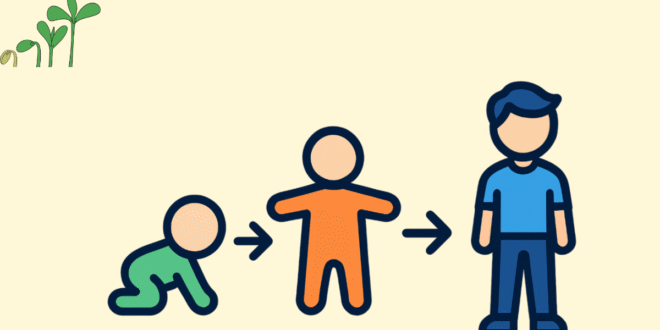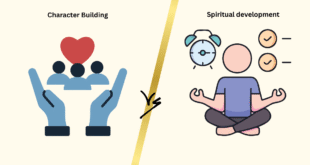Dr. Younus Khalid- Tarbiyah Parenting Coach, Trainer and Consultant
Understanding child development stages is one of the most essential steps for parents, educators, and caregivers. Children grow and develop rapidly, especially during the first few years of life. This journey is filled with milestones, challenges, and opportunities. By learning about these stages, you can support your child’s physical, emotional, social, and intellectual growth effectively.
In this detailed guide, we will explore the five key stages of child development, common milestones, and practical parenting tips to help your child thrive.
What is Child Development?
Child development is the process through which children grow physically, mentally, emotionally, and socially from birth to adulthood. It involves:
- Physical growth: Body changes such as height, weight, and motor skills.
- Cognitive development: Learning, problem-solving, and memory skills.
- Language development: Communication, speech, and understanding.
- Emotional development: Recognizing and managing emotions.
- Social development: Building relationships and interacting with others.
Every child is unique. While the stages follow a general pattern, the pace may vary depending on genetics, environment, parenting style, and other factors.
Why Understanding Child Development Stages Matters
Recognizing different child development stages is crucial for several reasons:
- Early detection of developmental delays: Parents can spot potential issues like speech delay or autism and seek early intervention.
- Better parenting decisions: Understanding your child’s needs helps you respond appropriately at each stage.
- Creating a nurturing environment: Knowing what to expect allows parents to create stimulating surroundings for healthy growth.
- Strengthening parent-child bonds: Awareness leads to empathy and better communication with children.
Major Stages of Child Development
Experts generally divide child development stages into five main periods:
- Infancy (0-2 years)
- Early childhood (3-6 years)
- Middle childhood (6-12 years)
- Adolescence (12-18 years)
- Young adulthood (18-25 years)
Let’s explore each stage in detail with milestones and parenting strategies.
-
Infancy (Birth to 2 Years)
The infancy stage is one of the fastest growth periods in a child’s life. Babies move from complete dependence on caregivers to developing basic motor and communication skills.
Key Milestones:
- Physical development:
- Gains control over muscles: rolling over, sitting, crawling, walking.
- Growth in height and weight is rapid.
- Cognitive development:
- Recognizes caregivers.
- Starts exploring surroundings.
- Develops object permanence (understands that objects exist even when not seen).
- Language development:
- Begins cooing, babbling, then saying first words.
- Social and emotional development:
- Forms attachment with parents.
- Shows fear of strangers.
- Expresses emotions through crying and smiling.
Parenting Tips:
- Respond quickly to your baby’s needs to build trust.
- Provide sensory stimulation through play and touch.
- Read and talk to your baby regularly to boost language skills.
- Ensure proper nutrition and regular pediatric checkups.
-
Early Childhood (Ages 3-6 Years)
Early childhood is often called preschool years. At this stage, children begin developing independence and social skills.
Key Milestones:
- Physical development:
- Improved balance and coordination.
- Runs, jumps, climbs, and begins basic sports.
- Cognitive development:
- Rapid language growth: vocabulary expands dramatically.
- Begins problem-solving and imaginative play.
- Understands basic concepts like numbers and colors.
- Social and emotional development:
- Forms friendships and enjoys group play.
- Starts understanding rules and routines.
- Develops empathy and self-awareness.
Parenting Tips:
- Encourage creativity through art, music, and storytelling.
- Set clear boundaries with consistent discipline.
- Introduce educational activities like puzzles and counting games.
- Teach kindness and sharing through role modeling.
-
Middle Childhood (Ages 6-12 Years)
This stage corresponds to school-age years, where children become more independent and focus on learning.
Key Milestones:
- Physical development:
- Growth slows but remains steady.
- Fine motor skills like handwriting improve.
- Cognitive development:
- Logical thinking and problem-solving strengthen.
- Interest in academic subjects increases.
- Memory and attention span grow.
- Social and emotional development:
- Peer relationships become very important.
- Develops sense of competence and self-esteem.
- Understands complex emotions like guilt and pride.
Parenting Tips:
- Support academic learning with a positive home environment.
- Encourage extracurricular activities like sports or music.
- Teach responsibility through age-appropriate chores.
- Address bullying or peer pressure with open communication.
-
Adolescence (Ages 12-18 Years)
The teenage years are marked by dramatic physical, emotional, and social changes. This stage involves identity formation and preparation for adulthood.
Key Milestones:
- Physical development:
- Puberty brings rapid growth and hormonal changes.
- Sexual maturity is reached.
- Cognitive development:
- Abstract thinking develops.
- Stronger ability to plan, reason, and analyze situations.
- Social and emotional development:
- Seeks independence and personal identity.
- Peer approval becomes a significant influence.
- Mood swings and emotional sensitivity are common.
Parenting Tips:
- Maintain open communication without judgment.
- Guide teens in setting healthy boundaries with technology and relationships.
- Encourage critical thinking and decision-making skills.
- Be a supportive role model while allowing space for independence.
-
Young Adulthood (Ages 18-25 Years)
Although legally considered adults, young people in this stage are still developing emotionally and socially.
Key Milestones:
- Physical development:
- Physical growth stabilizes.
- Peak physical performance is reached.
- Cognitive development:
- Advanced problem-solving and reasoning skills.
- Career and life goal setting.
- Social and emotional development:
- Develops mature relationships.
- Establishes personal values and belief systems.
Parenting Tips:
- Offer guidance without micromanaging decisions.
- Encourage financial literacy and independence.
- Support career and educational aspirations.
Factors Influencing Child Development
Several factors shape how children grow and achieve milestones:
- Genetics: Inherited traits play a vital role in physical and cognitive abilities.
- Nutrition: Proper diet is essential for brain and body development.
- Parenting style: Nurturing and responsive parenting encourages healthy growth.
- Environment: Safe, stimulating environments promote exploration and learning.
- Culture and society: Beliefs, traditions, and values affect behavior and identity.
- Health care: Regular checkups and early interventions prevent developmental delays.
Common Developmental Challenges
Even though growth follows predictable patterns, some children face challenges.
Here are common issues parents may encounter:
- Speech and language delays
- Learning disabilities like dyslexia
- Behavioral disorders such as ADHD
- Autism spectrum disorder (ASD)
- Emotional difficulties like anxiety or depression
When to Seek Help:
If you notice significant delays in speech, motor skills, or social interaction, consult a pediatrician or child psychologist. Early intervention greatly improves outcomes.
Practical Tips for Supporting Healthy Development
- Read together daily to boost language and bonding.
- Limit screen time and encourage outdoor play.
- Maintain consistent routines for meals, sleep, and learning.
- Model positive behavior through your own actions.
- Provide age-appropriate challenges to build confidence.
- Celebrate milestones, no matter how small.
- Stay involved in education, both at home and in school.
Child Development Stages Chart
| Age Range | Physical Milestones | Cognitive Milestones | Social/Emotional Milestones |
| 0-2 years | Crawling, walking, grasping | Object permanence, basic problem-solving | Attachment, expressing basic emotions |
| 3-6 years | Running, climbing, jumping | Vocabulary explosion, imaginative play | Friendship formation, empathy |
| 6-12 years | Improved motor coordination | Logical thinking, memory growth | Peer relationships, self-esteem |
| 12-18 years | Puberty, sexual maturity | Abstract thinking, decision-making | Identity formation, independence |
| 18-25 years | Physical peak | Career and life planning | Mature relationships, stable identity |
Conclusion
Understanding child development stages empowers parents and educators to nurture children at every step of their journey. Each stage brings unique joys, challenges, and responsibilities. By staying informed, being patient, and providing consistent support, you can help your child grow into a confident, capable, and compassionate adult.
 Edutarbiyah English Blog of Parenting and Tarbiyah
Edutarbiyah English Blog of Parenting and Tarbiyah



